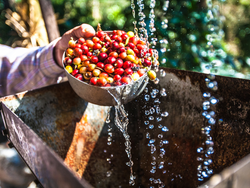
How Are Decaf Coffee Beans Produced?
Do you love the taste of coffee but aren’t a big fan of the caffeine rush? For many, caffeine can cause nervousness, jitters, or headaches. That is why people have fallen in love with decaf coffee beans.
While some wonder what the point is of drinking decaf, others swear by it. Decaffeinated coffee can be enjoyed right before bedtime without compromising your sleep and offers amazing health benefits.
But what exactly is the decaf coffee bean production process and how does it work? Caffeine is naturally in all coffee beans, and it is difficult to completely remove caffeine from them.
How is it done? Read on to find out.
The Decaffeination Process
The two most common methods used to create decaf coffee beans are the direct process method and the water process method.
Direct Process
Direct process beans are first steamed and soaked in water. Then, chemical solvents, usually ethyl acetate or methylene chloride, are mixed directly with the beans to remove the caffeine.
The methylene chloride extracts the caffeine from the bean, which can later be sold for soda or energy drinks. The solvent is then rinsed out of the green beans, and only the smallest trace is present in the decaf coffee beans, making them safe for consumption.
Water Process
The other method, known as the Swiss Water Process, relies on water and carbon filtration.
First, the beans are soaked in very hot water to extract their caffeine and flavour. The beans are removed from the water, and the water is passed through an activated carbon filter, which is designed to only capture the large caffeine molecules.
We are left with decaf coffee beans in one tank and flavour-rich water in the other.
That water is then used to remove the caffeine from the next batch of coffee beans, resulting in a decaffeination process without the loss of flavourful components. The Swiss Water Process is organic and 100% chemical-free.
Is Decaffeinated Coffee Beneficial for Pregnant Women?
Since decaf coffee beans have been processed to remove 97% of the caffeine content, decaf coffee is mostly safe for pregnant women. However, even though decaffeinated coffee contains very little caffeine, drinking too much of it can still pose a problem during pregnancy - so it is still important to drink it in moderation.
If women have a habit of drinking coffee, switching to decaf coffee for pregnancy gives them a sense of comfort and familiarity. Decaffeinated coffee allows pregnant women to satiate their cravings while avoiding the harmful effects of caffeine.
Is Decaf Good for You?
Coffee is known to lower health-related conditions, and it may be a surprise that decaf coffee can do just the same. Decaffeinated coffee can lower the risk of type 2 diabetes, improve sleep, and reduce stress.
It also has the same antioxidants as regular coffee and contains a lower acidic content, which can reduce the chance of heartburn and stomach issues. Caffeine in excess can lead to heart problems, so switching to decaf coffee beans reduces the risk of getting cardiovascular diseases.
Primo Caffe
If you are searching for the best decaf coffee beans on the market, Primo Caffe offers water-processed coffee that is 100% chemical-free.
The coffee is rich, flavourful, and guarantees a real coffee experience without the caffeine! If you thought decaf coffee couldn’t taste as good as regular coffee, think again. Need decaf coffee in pod form? We've got you covered with our decaf coffee pods!
Shop our decaffeinated coffee today!


